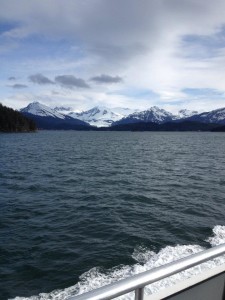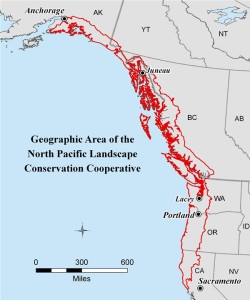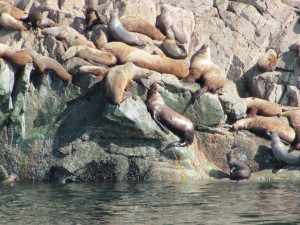We have much more to do and your continued support is needed now more than ever.
195 People to Thank: How Hard Work and Dedication Combat Climate Change in the NPLCC Region

6 Management Challenges Presented by Climate Change
Using a survey and thirteen web-based focus group discussions, we asked project participants a series of questions about how climate change was affecting their work to better understand the challenges and opportunities associated with managing ecosystems, habitats, and species in light of current and potential future climate change effects. After analyzing their answers, six primary climate change-related management challenges were identified:
- It is difficult to know how to identify and use climate-related science, data, tools, and/or information.
- It is difficult to incorporate uncertainty related to climate change into one’s work.

The NPLCC region is dominated by coastal temperate rainforests and some of the most productive marine waters in the world. (Credit: U.S. FWS) - Because climate change is most often framed as a new factor to consider in management, addressing climate change may compete with existing priorities or the wrong priorities may be pursued when climate change is not addressed in management practice.
- There is a lack of capacity to address climate change, including technical, institutional, and financial capacity.
- There are institutional, international, cultural, and/or social barriers to addressing climate change.
- There is a lack of coordination, collaboration, and communication around climate change issues.
We then asked project participants to suggest climate-related science and information needs that, if fulfilled, would advance their ability to incorporate climate change into their work. Potential science and information needs ranged from funding the collection of basic hydrologic data to mapping the location of vulnerable habitats or species and convening workshops to allow managers and scientists from diverse fields to collaborate on identifying adaptation approaches that will work across a broad landscape. The latter suggestion – convening workshops – was already a planned activity for our project.
3 Workshops to Identify and Inform Strategic Planning and Priority-setting
The three workshops brought together ecosystem and climate change experts from agencies, conservation organizations, and universities to further define and refine the potential science and information needs identified through the surveys and web-based focus groups. Participants were asked to evaluate a potential need across four criteria, each of which provides information to the NPLCC about when, where, or for what purpose a particular need is suggested:

- Decision-relevance: what decisions this information would help answer
- Spatial and temporal scale: specify the geographic region and whether the information is needed on an annual, seasonal, daily, etc. timescale
- Timeline/urgency: when this information is needed, tell us why this is important
- Partners/ongoing efforts: who might already have this information or might be well suited to develop it
The final step in this project is to synthesize the information gathered from the survey, web-based focus groups, and in-person workshops. My colleagues and I will work closely with our partners at the University of Washington Climate Impacts Group and the NPLCC to produce a report that is thoroughly reviewed by project participants and synthesizes the information gathered in a way that both accurately reflects participants’ feedback and helps inform the NPLCC’s short- and long-term planning and prioritization efforts.
195 People to Thank for Building the Partnership
All of this work and all of these results were made possible by the 195 project participants and partners that devoted their time, energy, and expertise to thinking about how the NPLCC could best advance climate change adaptation efforts in the region. It has been inspiring, educational, and fun. We have made great strides in just the last nine months; I can’t wait to see what this partnership does in the next nine months! Thank you, project participants and partners, for your commitment and insight throughout the process.





















